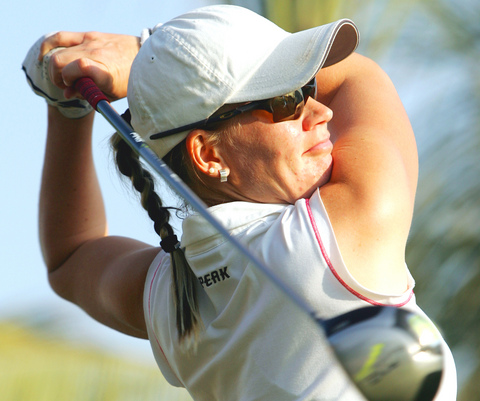In golf, one of the terms used most often is the word "par." Par is the number of strokes that a golfer is expected to take to get the ball into the hole. They decide what this number will be before the game based on how far the starting point is from the hole and if there are any hills or ponds that might make it hard to reach.
Par is used outside of the golfing world to talk about any standard. If something is better than you expected it to be, you can say that it is "above par." If something is worse than you expected, you can call it "below par."
Here are some examples of how par is used: "I'm really glad that we hired Polly. Her work at the office has been totally above par." Or: "Your schoolwork has really been below par this year. You usually get As and Bs, but now you're mostly getting Cs." (Emily Shih, Staff Writer)

PHOTO: AP
打高爾夫時,其中一個最常用的術語就是「par」(標準桿)。標準桿是高爾夫球員預計擊球進洞的桿數。他們要在比賽前依據擊球點離洞有多遠的距離,決定標準桿數。假如有山坡或水池,會更難達成目標。
par不用於高爾夫時,是講有關標準的事。假如某事比你預料中更好,你就可以說它「高於水準」,假如比你預料中差,你就可以它說是「低於水準」。
這裡有一些使用「par」的例句。「我真高興我們雇用波莉。她在辦公室的工作完全是超水準」或是︰「你今年的學業表現真的是低於標準。你以往都拿A或B等,但現在幾乎都拿到C等」。 (翻譯:賴美君)

Rice is essential to Japanese culture, tradition and politics. People take pride in the oval-shaped sticky Japonica grain, which is still a staple even though total consumption has fallen over the decades. But since last summer, prices have soared as supplies have fallen short of demand. The government has long paid farmers to cut back on rice acreage, and change to other crops to keep rice prices relatively high. To cope with shortfalls this year, the government has released rice reserves. But the grain has been slow to reach supermarket shelves. Anger over that was part of the reason the Agriculture Minister

In Taiwan, 7-Eleven convenience stores can be found on almost every street corner. With over 84,600 stores across 20 countries, 7-Eleven has more locations than any other retail business on Earth. For millions of people, the chain is an important part of daily life, providing coffee, quick meals, and essential items for those __1__. The history of 7-Eleven began nearly 100 years ago in Dallas, Texas. In 1927, the Southland Ice Company began selling blocks of ice that were used to keep fridges cool. Shortly after opening, the company __2__ its offerings to include groceries like milk, eggs, and

Step into any corner of Turkiye, and you’ll likely encounter the iconic “Evil Eye,” known as “nazar boncu?u” in Turkish. This striking blue glass ornament is shaped like an eye with concentric circles of dark blue, white, and light blue. While its name in English suggests something threatening, it’s actually a charm designed to ward off misfortune. The origins of the nazar boncu?u can be traced back to ancient Mediterranean and Middle Eastern traditions. The word nazar comes from Arabic, meaning “gaze,” while boncu?u translates to “bead” in Turkish. Central to the nazar boncu?u’s mythology is the idea that

Continued from yesterday(延續自昨日) https://www.taipeitimes.com/News/lang In 1946, the company adopted the name 7-Eleven to reflect its newly extended __3__, from 7am to 11pm, a novel concept at the time. As a rapidly growing company, it began offering franchise opportunities in the 1960s. In 1974, the first 7-Eleven in Japan was opened by the supermarket company Ito-Yokado. The Japanese franchises were __4__ successful that by 1991, Ito-Yokado was able to acquire a 70 percent stake in Southland Corporation. Its investments eventually resulted in full ownership of 7-Eleven, which paved the way for the Japanese company to enter the international market. Since then, 7-Eleven